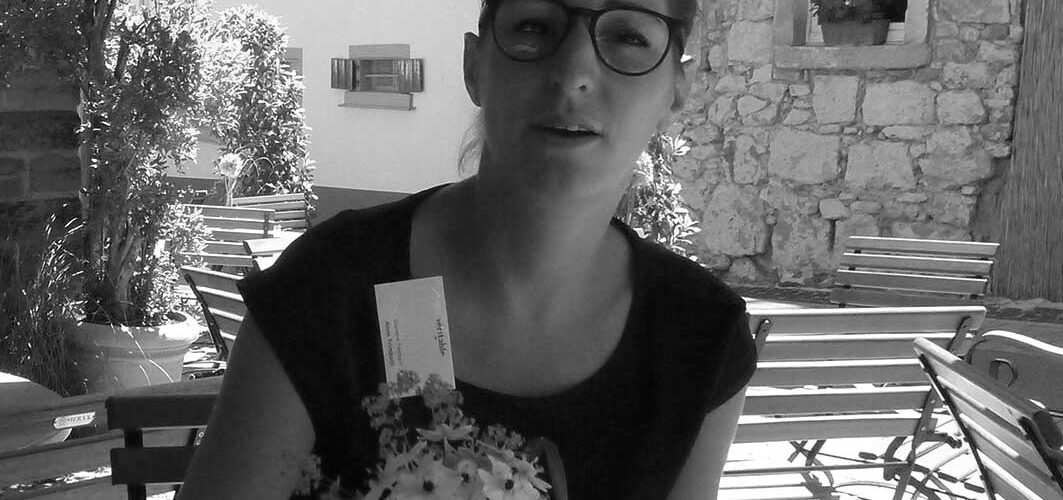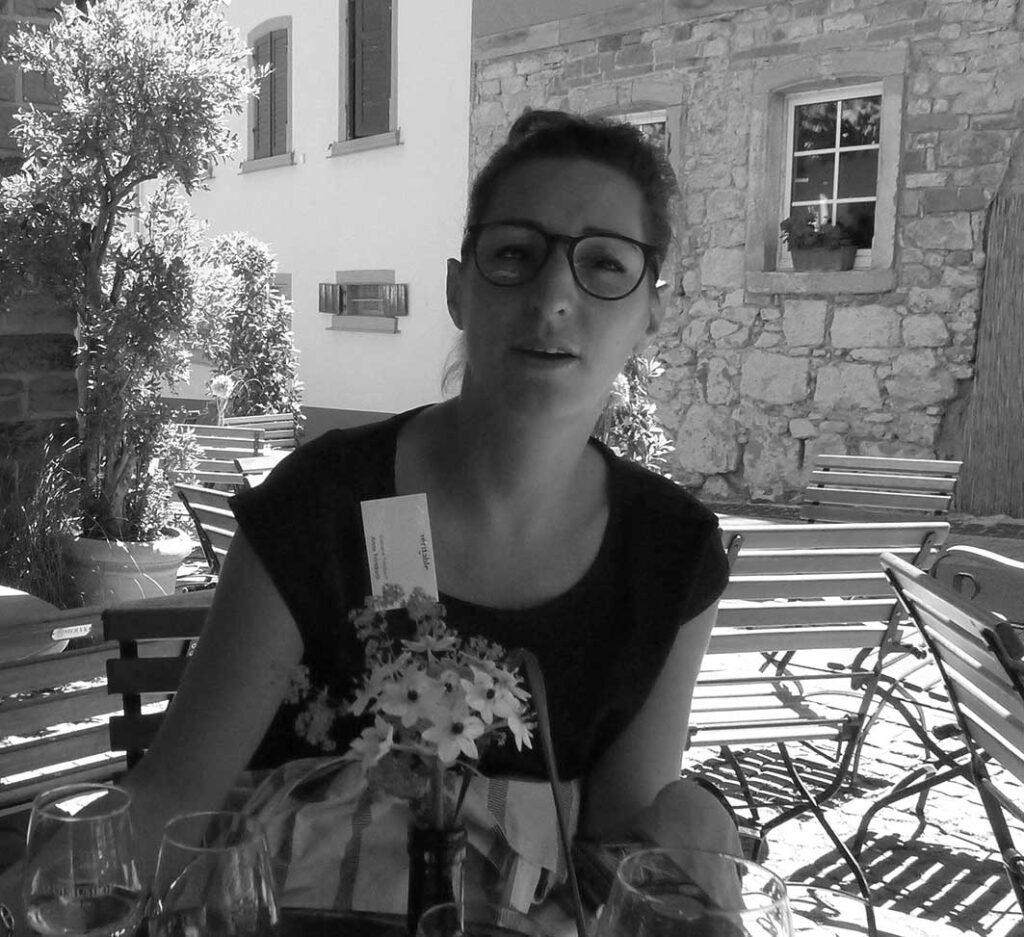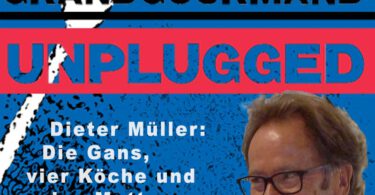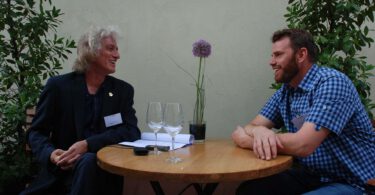Hardly anyone knows Alsatian wine as well as Anne Trimbach. Despite her youth, she is the grande dame of Riesling in Alsace. From her father, Pierre Trimbach, she inherited the love of wine. Today she is restlessly on her way to spread her message and make the wine of her homeland even better known. On the occasion of the Véritable 18, I had the pleasure to have an interview with her.
M.G.: Dear Anne, when one talks about Alsatian wine, the name Trimbach is directly on the tongue.
The Trimbach Wine House dates back to 1626, a really impressive number.
The name Trimbach is directly associated with the Riesling, although of course you also grow other wonderful wines there, the Gewürztraminer, the Pinot Blanc and the Sylvaner.
What makes winegrowing in Alsace so special?
A.T.: We don’t get very much rain, we have a very low rainfall in France. Just after the Perpignan-Area in the Southwest, we are the second drieest region in France. We are protected by the Vosges mountains, this climate makes it a little easier to produce these grapes. We have so much different types of soils, different terroirs, we can name 13 different terroirs families. In each parcel there is a different terroir, a different story to tell.
M.G.: Would you briefly characterize the vineyards of the Domaine Trimbach for our readers?
A.T.: We have 55 hectares, so it is very difficult to name all of them. But I can point out the famous vineyards: The Fréderic Emile for example, these are the vineyards Grand Cru Geisberg and Grand Cru Osterberg, right behind the winery. Beautiful soils, marle, limestone, sandstone, very old vines. Of course the Clos Ste Hune, which is very small, only 1,67 hectares, pure limestone. Now we have some Grand Crus vineyards, labeled after their names, like the Grand Cru Schlossberg and Grand Cru Geisberg.
M.G.: At the véritable we can enjoy the fantastic Clos Ste Hune 2012.
I notice some white pepper and slate aromas and flavors with dried fruits, Lemons, Papaya.
The wine has a tremendous elegance, like a blue-green river that flows smoothly through the landscape, a panorama of aromas. I myself always look for a musical counterpart when I taste a wine. To the Clos Ste Hune I immediately remember Ravel, the Piano Concerto in G major, the 2nd movement.
When you work on your wine, what goes through your mind, do you associate a certain piece of music with it, or do certain pictures appear in your mind?
A.T.: Maybe I never thought about this, I love music, and I drink wine while hearing music. I don’t know, if I have associated a special piece of music with one of our wines, maybe I should try this!
M.G.: Would you tell our readers the secret of this wine, the secrets of the Trimbach-Style?
A.T.: In the vineyards everything is balanced, the grapes are picked up at the right time, not too early, not too late. The balance in the cellar is important too. We don’t look at the numbers, we just taste and when we feel the balance we found the key. For us it is not so important, how high the sugar content is, or how it behaves with the acid.
M.G.: We all know that the personality of the winegrower is expressed in his wine. Is there a special vintage that represents your own ideas and dreams?
A.T.: Probably a few, I’ve been educated with this wines and I like, when the wines are very precise and the acidity is right there. I like vintages like 2008, 2010, cooler vintages
M.G.: Trimbach wines can be found all over the world, they are served at big ceremonies and have long been a well-known name in the top gastronomy.
Your wines are available in all 3-star Michelin restaurants in France.
How important is marketing in this context, how often do you travel around the globe to spread your message?
A.T.: Very often, I’m not the only traveler, my uncle Jean travels too. We spend months travelling. I was just two weeks in the USA right now, we travel constantly!
M.G.: Wine and food. Alsace is famous for its great cuisine, especially the classic cuisine is impressive and authentic. Do you have a special philosophy when it comes to combining food and wine? It is very complex, what happens there, should the wine support the dish or rather contrast?
A.T.: Both. Sometimes I want to drink a special wine and I cook exactly for this wine. Often something is simply cooked before one thinks of the wine. Like fish simply paired with white wine. But today it’s important to think about wine before you cook something, whether it’s in the Michelin cuisine or in a brasserie. Wine and food should complete themselves, not destroy themselves.
M.G.: Is there perhaps a German Riesling that you particularly like?
A.T.: Oh, yes, so many! I love the Mosel Rieslings, they are unique, only this region can do that. I like, for example, the wines of my current neighbor at Veritable, Dr. Bürklin-Wolf.
M.G.: When you grow up with the wine, is there even a thought to do something different?
A.T.: No, hmm…well, maybe I would have liked to become world champion in alpine skiing, but then you have to decide for the right one.
M.G.: The Trimbach House has been present at the Véritable for several years now. What is so special about this fair?
A.T.: Our director of sales, Wilhelm, met Uwe Warnecke, and they became good friends. Mr. Gresser had good contact with him. It’s fantastic, it’s amazing, Uwe Warnecke is a very special wine character as well, a top personality.
M.G.: It is said about the 2015 vintage that this would perhaps be the best vintage ever, what is so special about it?
A.T.: Very warm and dry vintage, one day of rain from May to August, very unique. My grandfather Bernard says that he thinks of 1971 vintage, but more extreme. At the end, a wonderful vintage!
M.G.: Are there days when you go to the vineyards with your father Pierre to recharge your batteries and get new inspiration together?
A.T.: Yes, but I also like it alone !
M.G.: Is there a specific project that is particularly close to your heart for the future?
A.T.: Yes, I want people to think about Alsace as a traditional region, but with new winegrowers, with young winemakers who produce the wine better than in the past. I want people to forget all the negative of the past 40 years and instead recognise the positive in Alsace.
One should think differently about Alsace, so that it is finally perceived in the scene as it deserves it.
M.G.: Dear Anne, thank you for this interview!
Download Interview as PDF
![[:de]Grandgourmand, Travel, Food, Lifestyle[:]](https://grandgourmand.de/wp-content/uploads/2023/01/logo_23_1-1.png)





